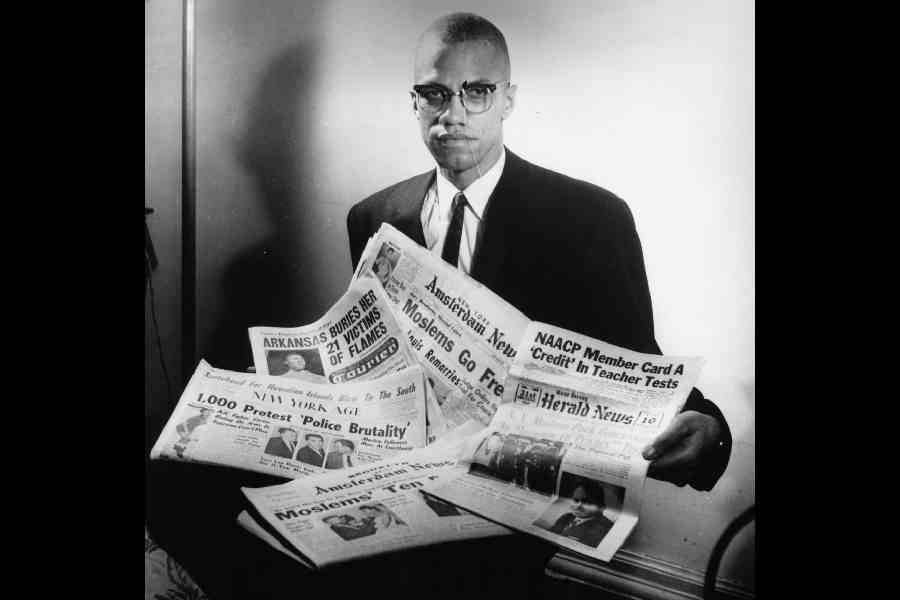This year, the world marks the 100th birth anniversary of Malcolm X, one of the most dynamic, misunderstood, and profoundly influential figures of the twentieth century. As the United States of America and much of the world continue to grapple with questions of racial justice, inequality, and freedom, Malcolm’s voice remains startlingly alive not only because of the urgency with which he spoke truth to power but also because of the intellectual and moral vision he left behind, a vision grounded in dignity, resistance, and human rights.
The life and ideas of Malcolm X gained significant intellectual traction in the 1960s. As his speeches and writings became more widely studied, his influence extended beyond discussions of race to address broader questions of power, justice, and historical narrative. Evidently, the works of African-American and South African writers, such as Ralph Ellison, James Baldwin, Toni Morrison and Nadine Gordimer, among others, reflect similar themes of resistance, self-definition, and the demand for justice, echoing Malcolm X’s commitment to speaking truth and asserting one’s voice in the face of oppression. These intellectual currents continue to shape discussions around identity, power, and social justice.
Remembering Malcolm X is not simply an act of historical commemoration — it is also a deeply personal act for many. For those who grew up in the 1960s, fragments of the Civil Rights Movement were often filtered through headlines and hushed conversations. While Martin Luther King Jr’s message of non-violence dominated the global narrative, Malcolm X’s legacy was often viewed in more complex terms, his rhetoric characterised as confrontational and his politics seen as radical. Despite this, his unflinching honesty and fierce dignity have had a lasting impact, resonating with many who continue to grapple with the issues he addressed
Malcolm X’s life was shaped by struggle long before it became political. Born Malcolm Little in Omaha, Nebraska, in 1925 on May 19, he experienced racial discrimination from his earliest days. His father, a follower of Marcus M. Garvey, a towering figure in the early-20th-century Black liberation movement, was believed to have been murdered by White supremacists. His mother was institutionalised and Malcolm’s childhood was marked by poverty, dislocation, and the trauma of systemic racism that led to his adoption of the surname, ‘X’, to symbolise the loss of his ancestral African name taken from his forbears through slavery. His early years in Boston and Harlem saw him drawn to street life, eventually leading to imprisonment. Yet it was in prison that he underwent one of the most extraordinary personal transformations in modern history, educating himself, embracing Islam through the Nation of Islam, and emerging
as a persuasive leader with unsurpassed oratorical skills and political insight.
What has struck many through the last century is his refusal to confine the Black American experience to the narrow discourse of civil rights. He argued, instead, for human rights, demanding that the plight of African- Americans be brought before the United Nations and placed in the same moral category as colonialism, apartheid, and global racism. This was a radical move. It forced America to look in the mirror not just legally but morally and historically. For Malcolm, justice was not a gift to be granted by the State; it was an unassailable right.
This framework, where human rights supersede racialised interests, highlights the global relevance of Malcolm X’s thinking. His insistence on linking struggles across borders, from Harlem to Johannesburg, Mississippi to Palestine, and Detroit to Delhi, reveals a vision of justice that transcends national boundaries. Malcolm X understood that systems of oppression are interconnected, with colonialism and White supremacy forming part of a broader structure of dominance. His work anticipated key themes in postcolonial cultural theory and critical race studies, emphasising that race is a construct tied to histories of power, violence, and resistance. This perspective continues to inform anti-racist scholarship and activism today.
Malcolm X’s life trajectory was also characterised by profound growth and development, reflecting his willingness to adapt and evolve his perspectives. His split from the Nation of Islam in 1964 marked a turning point. No longer constrained by the sectarianism and the dogma of the organisation, Malcolm founded Muslim Mosque, Inc. and the Organization of Afro-American Unity. His pilgrimage to Mecca that same year profoundly changed him. There, for the first time, he experienced a spiritual fellowship that challenged the binary categories of Black and White he had previously embraced. He returned to the US with a broader, more inclusive, vision, one that emphasised solidarity among oppressed peoples across race, religion, and nationality.
It was after Mecca that Malcolm began to speak more forcefully of compassion; not a passive or sentimental compassion but a deeply political one. He spoke of love as a form of resistance, of justice as a moral imperative, of unity grounded not in uniformity but in shared struggle. His final speeches reflect this expanded world view where he no longer was speaking just to Black Americans but to all those crushed under the weight of Empire, capitalism, and racism.
His unwavering commitment to this vision came at a tremendous cost. His home in Queens was fire-bombed. He was surveilled by the Federal Bureau of Investigation, targeted by rivals, and increasingly isolated. On February 21, 1965, he was assassinated while delivering a speech at the Audubon Ballroom in New York. He was just 39 years old. The fire that had lit his life consumed him, but not silenced him.
Malcolm X indeed remains a figure of enduring relevance in academia, particularly in fields related to history, power, and resistance. His legacy challenges scholars to confront uncomfortable truths, rethink dominant narratives, and engage in what Edward Said termed “the permission to narrate.” Malcolm X’s impact is also evident in postcolonial literature where his refusal to accept the erasure of Black voices and his understanding of language as a tool for liberation continue to inspire critical thought and resistance.
Recalling Malcolm X is about honouring a life that continues to inspire educators and activists. His life, marked by the scars of violence, fuelled by resistance, and redeemed by a powerful vision, serves as a model for those who believe that education and struggle must be intertwined with liberation. The systemic issues Malcolm X fought against, such as racialised policing, exploitation of marginalised groups, and the devastating impact of military actions justified under the guise of peace, remain pressing concerns today.
Today, a century after his birth, Malcolm X’s legacy is perhaps more relevant than ever. His profound insights — that resistance is an ongoing stance, justice is grounded in the lived experiences of the marginalised, and the pursuit of human dignity knows no borders — continue to galvanise movements for social change and human rights.
Shelley Walia has taught in Panjab University










